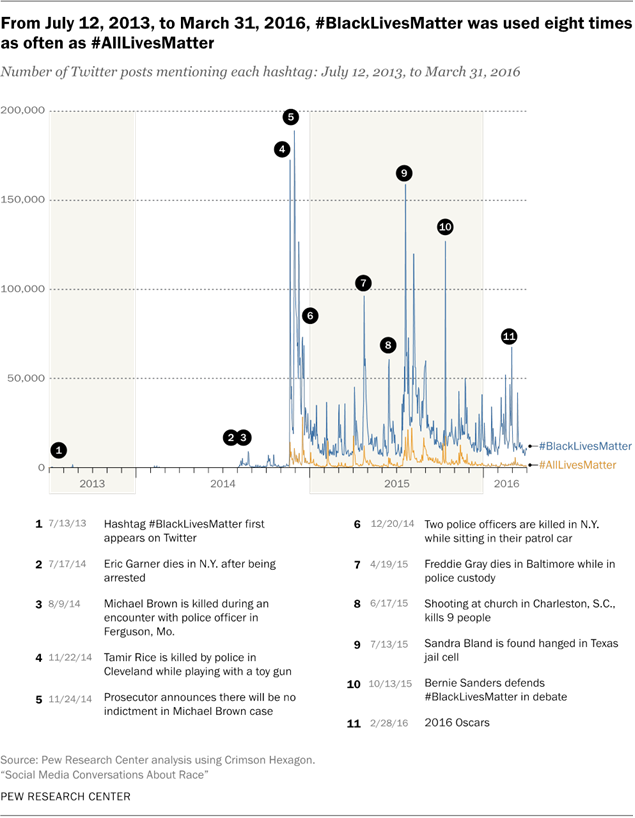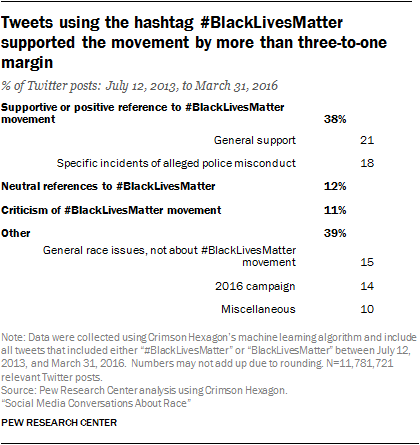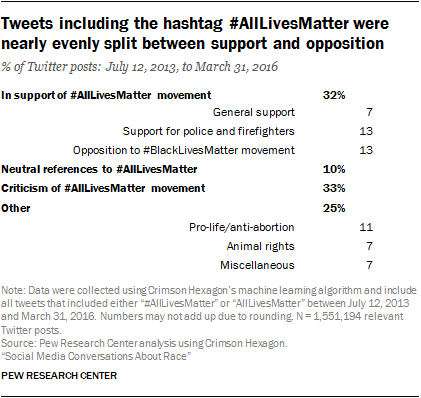In recent years, social media have become a common way for political groups and social movements to organize. On Twitter’s 10-year anniversary, the site published a list of the most used hashtags related to social causes. Two of the top three were directly related to issues of race. According to Twitter, #Ferguson was the most used social-issue hashtag in the 10-year history of the platform, while #BlackLivesMatter was third.

Along with examining tweets that mentioned race in a general sense, the Center’s analysis looked at all tweets that included the #BlackLivesMatter and #AllLivesMatter hashtags from July 12, 2013, to March 31, 2016. These tweets (13.3 million in total) were then analyzed using Crimson Hexagon’s algorithmic tool to determine their subject matter and tone. (A previous Pew Research Center study surveyed Americans on their awareness of and attitudes towards issues of racial equality.)
Historically, hashtags developed as an informal method of highlighting ideas in unformatted text and trying to grow conversation around a topic. In 2009, Twitter began to hyperlink and compile hashtags, making them searchable and increasing their utility as identifiers. While most hashtags are developed organically, some groups deliberately use hashtags to promote a message.
In mid-2014, as the issue of use of force by police gained national attention due to several high profile cases involving black men, some activists promoted hashtags as a way to identify their messages and display solidarity.
This was the case with the Black Lives Matter movement. Organizers of Black Lives Matter made social media – and specifically the hashtag #BlackLivesMatter – a centerpiece of their strategy. As a result, the growth of the movement offline was directly linked with the online conversation. 8
An early timeline of the #BlackLivesMatter and #AllLivesMatter hashtags
All told, from its initial appearance in mid-2013 through March 2016, the hashtag #BlackLivesMatter has appeared on Twitter almost 11.8 million times.
As a direct response to #BlackLivesMatter, some on Twitter began using the hashtag #AllLivesMatter. That hashtag has been used a total of 1.5 million times, about one-eighth as often as #BlackLivesMatter. Over time, the volume of #AllLivesMatter tweets has generally moved in parallel with that of #BlackLivesMatter.
The phrase “black lives matter” was first used by a black community organizer in a Facebook post following the July 2013 acquittal of George Zimmerman in the shooting death of black 17-year-old Trayvon Martin. 9 Despite its widespread presence today, the hashtag was slow to gain prominence: During the second half of 2013, it appeared on Twitter a total of just 5,106 times (or about 30 times a day).
Both the use of the hashtag and the influence of the broader Black Lives Matter movement accelerated greatly in August 2014 when Michael Brown, a black teenager, was fatally shot by a white police officer in Ferguson, Missouri.
The #BlackLivesMatter hashtag appeared an average of 58,747 times per day in the roughly three weeks following Brown’s death. However, the use of the hashtag increased dramatically three months later when on November 25, the day after a Ferguson grand jury decided not to indict the officer involved in Brown’s death, the #BlackLivesMatter hashtag appeared 172,772 times. During the subsequent three weeks, the hashtag was used 1.7 million times.
Since late 2014, #BlackLivesMatter has been a continuous presence on Twitter, but its use has increased around some specific events. These include:
- On Dec. 4, 2014, the day after a New York grand jury decided not to indict police officers in the death of Eric Garner, #BlackLivesMatter appeared 189,210 times – the most it was ever used in a single day.
- The Oct. 13, 2015, presidential campaign debate in which Senator Bernie Sanders defended the Black Lives Matter movement and decried institutional racism spurred the hashtag to appear more than 127,000 times on Twitter the following day as many users voiced support for Sanders.
- On the one-year anniversary of Brown’s death, August 9, 2015, the hashtag appeared 120,067 times as well as 98,518 times the following day.
As for #AllLivesMatter, the hashtag appeared on Twitter a few times prior to the unrest in Ferguson in August 2014. However – as was the case with #BlackLivesMatter – it was the day after the announcement that there would be no grand jury indictments in the Michael Brown case when the hashtag began appearing regularly. On Nov. 25, 2014, #AllLivesMatter was used 14,308 times.
The day in which the hashtag #AllLivesMatter appeared the most during this time period was Dec. 21, 2014, the day after two police officers were killed in New York City while in their patrol car. That day the hashtag appeared 28,526 times. The hashtag #BlueLivesMatter, usually used to express support for police, was used 22,834 times that day.
The #BlackLivesMatter hashtag has been used frequently in support of the broader social movement or to flag general racial issues, occasionally as a form of criticism
From its first appearance in mid-2013, Twitter users have utilized the #BlackLivesMatter hashtag for a range of purposes. Supportive or positive references to the broader movement are among the most common. But in some cases, people included #BlackLivesMatter in tweets to criticize the movement – or simply identify the subject matter of their posts and attach them to the broader discussion occurring around racial issues.
Supportive or positive references to the broader movement make up a large portion of tweets utilizing the #BlackLivesMatter hashtag

Tweets using the #BlackLivesMatter hashtag that are generally supportive of the movement are much more common than those opposing it. Over the period studied, 38% of the tweets that included #BlackLivesMatter were supportive or made positive reference to the social movement.
Slightly more than half of those, representing 21% of all the tweets using the hashtag, offered broad support for racial equality and opposition to police brutality. This February 2014 post by Mag-net, a network of social organizations, is one example:
#blacklivesmatter is a response to the dehumanization of black people. But it’s also a call to action. @aliciagarza #mediajustice
— MAG-Net (@mediaaction) February 26, 2014
//platform.twitter.com/widgets.jsOthers used the hashtag when describing efforts to organize protests, as in this tweet by Chicago-based activist Byron Sigcho:
‘Honoring the legacy of MLK by organizing’ #BlackLivesMatter #MLKchi #ReclaimChicago @peopleslobbyusa @PilsenAlliance @gozamos @mikeklonsky
— Byron Sigcho (@TeamSigcho) January 17, 2015
//platform.twitter.com/widgets.js
Another 18% of tweets utilized the hashtag to connect specific incidents of alleged police misconduct. For example, a number of Black Lives Matter supporters focused on the November 2014 death of 12-year-old Tamir Rice in Cleveland, as in this tweet:
Officer who killed Tamir Rice found unfit in previous police job http://t.co/UncePJxA2f via @msnbc#TRIBELIVE #CLEVELAND #BLACKLIVESMATTER!!
— Jazzmine D. McKnight (@Progress4Ohio) August 26, 2015
//platform.twitter.com/widgets.js
Among the other incidents #BlackLivesMatter supporters focused on were the April 2015 death of Freddie Gray while in police custody in Baltimore; the March 2015 shooting death of 19-year-old Tony Robinson at the hands of police in Madison, Wisconsin; and the contentious arrest of University of Virginia student Martese Johnson that same month.
Many tweets used the #BlackLivesMatter hashtag to engage with broader discussions around race
Not all the uses of #BlackLivesMatter were directly tied to specific incidents. In 15% of the tweets using the hashtag, the author was making a larger point about race – without directly focusing on the modern-day social movement. For instance, many people offered thematic quotes:
A System Cannot Fail Those It Was Never Meant To Protect. #BlackLivesMatter
— katori (@iamkatori) July 23, 2015
//platform.twitter.com/widgets.js
Variations of this particular quote appeared in tweets alongside the hashtag #BlackLivesMatter more than 2,200 times. This message, which first appeared in 2013, was often attributed incorrectly to the sociologist W.E.B. Du Bois.
Around one-in-ten tweets using the #BlackLivesMatter hashtag were critical of the movement
As the Black Lives Matter movement grew and the use of the hashtag increased, a number of tweets began to object to the movement. Some critics felt it was valuing one race above all others, while others felt the movement was unfairly condemning all police officers based on the actions of a few.
In fact, 11% of the posts including the #BlackLivesMatter hashtag were critical of the movement and/or the actions of its supporters. Sometimes these posts utilized very strong language, as in this tweet by a retired solider:
Hey #BlackLivesMatter, police saves MORE black lives everyday, than you cowards ever will, in your pathetic lifetime! #AllLivesMatter ??
— David Higgins (@dhiggins63) September 11, 2015
//platform.twitter.com/widgets.js
How the #AllLivesMatter hashtag was used: a more even mix of support and criticism
Unlike the #BlackLivesMatter hashtag, the mentions of #AllLivesMatter from July 2013 to March 2016 were nearly evenly split between positive and negative posts.
About one-third of #AllLivesMatter tweets were supportive of the general sentiment, but few focused on a larger movement

In contrast to the use of #BlackLivesMatter, posts which used #AllLivesMatter in a positive manner were less likely to connect their posts with a broader social agenda. Only 7% of the tweets using #AllLivesMatter took this position. Notably – and in contrast to the #BlackLivesMatter hashtag – #AllLivesMatter did not have a specific organization backing it or promoting its use in its early stages.
More tweets, 13%, were aimed at defending the people or organizations that were often criticized by #BlackLivesMatter – most often the police. For example, in September 2015, an account for the Office of the Lieutenant Governor of Texas Dan Patrick linked to a formal statement opposing violence toward police:
#AllLivesMatter & we must end violence against our law enforcement officers: http://t.co/zBQvznTVgT #TxLege
— Office of the Lt Gov (@LtGovTX) September 2, 2015
//platform.twitter.com/widgets.js
Another 13% of the tweets with #AllLivesMatter focused on condemning the #BlackLivesMatter movement.
One-third of tweets with #AllLivesMatter were critical of its meaning
A backlash against #AllLivesMatter developed that was just as large as the hashtag itself. In fact, 33% of the tweets that contained the hashtag were criticizing the premise of #AllLivesMatter – almost the same amount (32%) that used #AllLivesMatter in a positive light.
To critics, #AllLivesMatter was a minimization of the concerns of minorities, especially in regards to issues of police brutality and discrimination.
Syndicated columnist Arthur Chu illustrated this view on November 27, 2014:
Do people who change #BlackLivesMatter to #AllLivesMatter run thru a cancer fundraiser going “THERE ARE OTHER DISEASES TOO”
— Arthur Chu (@arthur_affect) November 27, 2014
//platform.twitter.com/widgets.js
Chu’s message was retweeted more than 11,000 times.
#AllLivesMatter gets used by other movements
While the vast majority of the use of #AllLivesMatter was in reference to conversations on race, several other movements used the hashtag in different contexts.
About one-in-ten (11%) tweets with #AllLivesMatter were used by someone opposing abortion. Many of those were connected with the 2015 controversy involving videos that purported to show wrongdoing committed by the health services organization Planned Parenthood. In January 2016, one user tweeted:
Americans Need To Stand United For Life. #WeThePeople Must #DefundPP TODAY.✞#PrayToEndAbortion#AllLivesMatter#RedNationRising#RenewUS
— Byron (@Metz_Byron) January 5, 2016
//platform.twitter.com/widgets.js
Another 7% of tweets were used to promote animal rights, sometimes in support of vegetarianism. Musician Kristin Star expressed this sentiment in November 2014:
Save Lives…Live Compassionately…Be Vegan!!! #EveryoneCounts#AllLivesMatter#HelpChangetheWorld#Life#Love#Peace#Vegan#LivePeace
— Kristin Star (@Kristin_Star) November 16, 2014